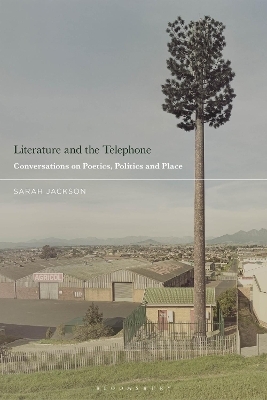
Literature and the Telephone
Bloomsbury Academic (Verlag)
978-1-350-26977-4 (ISBN)
- Noch nicht erschienen (ca. April 2025)
- Versandkostenfrei innerhalb Deutschlands
- Auch auf Rechnung
- Verfügbarkeit in der Filiale vor Ort prüfen
- Artikel merken
Addressing the telephone’s complex, multiple and mutating functions, and drawing on recent work by writers and thinkers including Sara Ahmed, Stacy Alaimo, Judith Butler, Nicholas Royle and Eyal Weizman, this open access book considers the linguistic, technical and conceptual disruptions of the literary telephone as well as the poetic and political possibilities of the exchange.
Focusing on the telephonic effects of post-war writing by authors such as Mourid Barghouti, Caroline Bergvall, Tom Raworth, Muriel Spark, Ali Smith and Rita Wong, Sarah Jackson proposes that the uncanny logic of the telephone, and its capacity for ordering and disordering the text, speaks to some of the most urgent concerns of our era.
Examining topics ranging from surveillance and migration to warfare and electronic waste, Jackson argues that the literary telephone offers new ways of conceiving ethical and creative technological futures, as well as different modes of reading, writing and listening across cultures.
The ebook editions of this book are available open access under a CC BY-NC-ND 4.0 licence on bloomsburycollections.com. Open access was funded by Nottingham Trent University.
Sarah Jackson is Associate Professor in Modern and Contemporary Writing at Nottingham Trent University, UK. She is a BBC New Generation Thinker (2016), AHRC Leadership Fellow (2018--2020) and NTU VC Outstanding Researcher (2017). Her publications include Tactile Poetics (2015), Pelt (2012), and a special issue of parallax on the ‘unidentifiable literary object’ (2019).
Preface: Hello, yes? Introduction – Switchboard
Chapter 1 – Queer Lines: Voice and Desire in E. M. Forster, Dana Spiotta and Haruki Murakami
Chapter 2 – Scrambled Messages: Networks of Signification in Patrick Hamilton and Jon McGregor
Chapter 3 – Telepoetics: Interference and Errancy in Frank O’Hara, Tom Raworth and Fady Joudah
Chapter 4 – Secrets: Call and Response in Muriel Spark
Chapter 5 – Listening--In: Reading Surveillance in Graham Greene, Anna Burns and Will Self
Chapter 6 – Calling without Calling: Mourid Barghouti, Jacques Derrida and ‘The International Day of Telephones’
Chapter 7 – Distress Calls: New (Im)mobilities in Behrouz Boochani and Asiya Wadud
Conclusion – Telefutures: Electronic Waste in Emily St John Mandel and Ling Ma
Afterword – The Long Goodbye
Bibliography
| Erscheinungsdatum | 05.08.2023 |
|---|---|
| Zusatzinfo | 10 bw illus |
| Verlagsort | London |
| Sprache | englisch |
| Maße | 156 x 234 mm |
| Themenwelt | Geisteswissenschaften ► Sprach- / Literaturwissenschaft ► Anglistik / Amerikanistik |
| Geisteswissenschaften ► Sprach- / Literaturwissenschaft ► Literaturgeschichte | |
| Geisteswissenschaften ► Sprach- / Literaturwissenschaft ► Literaturwissenschaft | |
| Sozialwissenschaften ► Kommunikation / Medien ► Kommunikationswissenschaft | |
| ISBN-10 | 1-350-26977-8 / 1350269778 |
| ISBN-13 | 978-1-350-26977-4 / 9781350269774 |
| Zustand | Neuware |
| Informationen gemäß Produktsicherheitsverordnung (GPSR) | |
| Haben Sie eine Frage zum Produkt? |
aus dem Bereich


